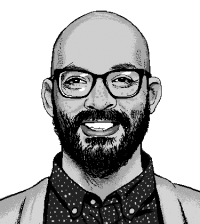The novelist and the theologian
I’m trying to live as Haruki Murakami writes: with questions but not an end in mind.

Have you ever woken up and felt your world had become completely strange, almost foreign? I’m sure this is a disconcerting feeling for anyone. For those of us trained to study and think about particular slivers of the world, the vertigo is especially distressing. Even before the pandemic, the acceleration of seemingly endless news cycles of economic, ecological, and social fraying was hard to keep up with. For me, this acceleration was coupled with teaching theology, coming to class every day with hope and some sort of explanation—something that would suggest it could be different. But it never seemed to be.
I’ve been telling people that the last few years “broke my brain.” I just didn’t have an explanation. But it was more than that. I didn’t know what to pray for, so I stopped. I didn’t know how to make a sense of the fragile psychologies of Whiteness and patriarchy, or of why institutions would let themselves crumble rather than see the possibility of life with God for all of us.
To be perfectly honest, I stopped trying. I did my job. I believed what I was teaching, at least, but I wasn’t furiously pumping water out of the boat anymore. The waves were crashing, the water was rising. At some point I stopped bailing and just held my breath and wondered how long I’d be able to tread water.
Not exactly the picture of faith, I suppose. All that was left to do amid my treading water was to remember: remember why I believed in the first place, why I read, why I teach, why I write. I tried to read a few lines at a time, to write a few words.
So, after barely reading for the last few years, I committed to a book in January, a Christmas gift from my son: Haruki Murakami’s Novelist as a Vocation. I was hoping for a balm, but like so many things that heal, there was also a sting. Its lines are still picking at me, the theologian, teacher, and theorist. He writes,
In my considered opinion, anyone with a quick mind or an inordinately rich store of knowledge is unlikely to become a novelist. That is because the writing of a novel, or the telling of a story, is an activity that takes place at a slow pace—in a low gear, so to speak. . . . For the most part, novelists are trying to convert something present in their consciousness into a story. Yet there is an inevitable gap between the preexisting original and the new shape it is spawning. . . . This is quite a roundabout way to do things, and it takes a great deal of time. Someone whose message is clearly formed has no need to go through the many steps it would take to transpose that message into a story. All he has to do is put it directly into words. . . . Quick thinkers are capable of that kind of thing.
I write a lot about certainty every day. Maybe I am trying to convince myself more than anyone else, because when I read these lines, I realized just how much Christian faith has been a journey of brilliance for me. How can I distill these ideas? How can I communicate them clearly? How can I express wonder at the way a writer describes God or our world in such precise and incisive ways? These are not bad things; certainly we need people who can do this work. Maybe I’m even doing it right now.
It’s the first bit from Murakami that hasn’t left me: we theologians tend to write about what we already know, while the novelist writes out of the gaps. Now, I know many of my friends in the academy would say that they write to find out, that their work is not unlike what Murakami is describing here. And I know this to be true. But we also teach certainty; we introduce students to guilds with settled questions and answers and methods. And we serve churches and pastors who desperately want God, their church, and their worship life to answer questions—rather than provoke new ones or ask us to walk slowly in the gaps to discover what the story might be.
What if the life of faith has less to do with answers and more to do with writing from those inchoate presences, trying to convert them into a story in our life? In our communities? Maybe most of us are already doing this in some form or another.
In the face of problems that increasingly do not make sense to me, this has been my prayer, the little piece of the boat’s bow that found its way to the surface to let me rest a bit. What if even amid the crumbling of the world we thought we knew, our faith was more in the living to find the answer instead of living out the answer? What if this is the point of Jesus’ life and death and resurrection?
Maybe God invites us to live a life the way a novelist writes a story: not with the end in mind, but sitting every day with questions and wonder and making marks until form begins to take shape. I wonder if this begins with embracing the pieces floating in our midst and grabbing what we can, even if they are a few pages of a book gifted to us. Scratching out a few lines when we don’t know how it will end.
Maybe this is how we get free. Maybe this is the Good News, the kingdom already here, all of us writing, living, sharing, and finding after some time that a story is bubbling up around us.






